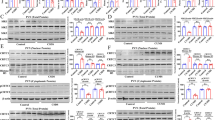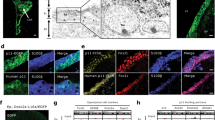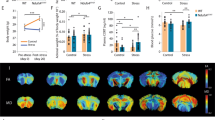Abstract
Interactions between genetic and environmental factors, like exposure to stress, have an important role in the pathogenesis of mood-related psychiatric disorders, such as major depressive disorder. The polyspecific organic cation transporters (OCTs) were shown previously to be sensitive to the stress hormone corticosterone in vitro, suggesting that these transporters might have a physiologic role in the response to stress. Here, we report that OCT2 is expressed in several stress-related circuits in the brain and along the hypothalamic-pituitary-adrenocortical (HPA) axis. Genetic deletion of OCT2 in mice enhanced hormonal response to acute stress and impaired HPA function without altering adrenal sensitivity to adrenocorticotropic hormone (ACTH). As a consequence, OCT2−/− mice were potently more sensitive to the action of unpredictable chronic mild stress (UCMS) on depression-related behaviors involving self-care, spatial memory, social interaction and stress-sensitive spontaneous behavior. The functional state of the glycogen synthase kinase-3β (GSK3β) signaling pathway, highly responsive to acute stress, was altered in the hippocampus of OCT2−/− mice. In vivo pharmacology and western blot experiments argue for increased serotonin tonus as a main mechanism for impaired GSK3β signaling in OCT2−/− mice brain during acute response to stress. Our findings identify OCT2 as an important determinant of the response to stress in the brain, suggesting that in humans OCT2 mutations or blockade by certain therapeutic drugs could interfere with HPA axis function and enhance vulnerability to repeated adverse events leading to stress-related disorders.
This is a preview of subscription content, access via your institution
Access options
Subscribe to this journal
Receive 12 print issues and online access
$259.00 per year
only $21.58 per issue
Buy this article
- Purchase on Springer Link
- Instant access to full article PDF
Prices may be subject to local taxes which are calculated during checkout






Similar content being viewed by others
References
Wong ML, Licinio J . Research and treatment approaches to depression. Nat Rev Neurosci 2001; 2: 343–351.
Krishnan V, Nestler EJ . The molecular neurobiology of depression. Nature 2008; 455: 894–902.
Caspi A, Hariri AR, Holmes A, Uher R, Moffitt TE . Genetic sensitivity to the environment: the case of the serotonin transporter gene and its implications for studying complex diseases and traits. Am J Psychiatry 2010; 167: 509–527.
Mazure CM, Bruce ML, Maciejewski PK, Jacobs SC . Adverse life events and cognitive-personality characteristics in the prediction of major depression and antidepressant response. Am J Psychiatry 2000; 157: 896–903.
Lupien SJ, McEwen BS, Gunnar MR, Heim C . Effects of stress throughout the lifespan on the brain, behaviour and cognition. Nat Rev Neurosci 2009; 10: 434–445.
Herbert J . Cortisol and depression: three questions for psychiatry. Psychol Med 2013; 43: 449–469.
Ulrich-Lai YM, Herman JP . Neural regulation of endocrine and autonomic stress responses. Nat Rev Neurosci 2009; 10: 397–409.
Ziegler DR, Herman JP . Neurocircuitry of stress integration: anatomical pathways regulating the hypothalamo-pituitary-adrenocortical axis of the rat. Integr Comp Biol 2002; 42: 541–551.
Kvetnansky R, Sabban EL, Palkovits M . Catecholaminergic systems in stress: structural and molecular genetic approaches. Physiol Rev 2009; 89: 535–606.
Vialou V, Balasse L, Callebert J, Launay JM, Giros B, Gautron S . Altered aminergic neurotransmission in the brain of organic cation transporter 3-deficient mice. J Neurochem 2008; 106: 1471–1482.
Bacq A, Balasse L, Biala G, Guiard B, Gardier AM, Schinkel A, et al. Organic cation transporter 2 controls brain norepinephrine and serotonin clearance and antidepressant response. Mol Psychiatry 2012; 17: 926–939.
Horton RE, Apple DM, Owens WA, Baganz NL, Cano S, Mitchell NC, et al. Decynium-22 enhances SSRI-induced antidepressant-like effects in mice: uncovering novel targets to treat depression. J Neurosci 2013; 33: 10534–10543.
Grundemann D, Schechinger B, Rappold GA, Schomig E . Molecular identification of the corticosterone-sensitive extraneuronal catecholamine transporter. Nat Neurosci 1998; 1: 349–351.
Hayer-Zillgen M, Bruss M, Bonisch H . Expression and pharmacological profile of the human organic cation transporters hOCT1, hOCT2 and hOCT3. Br J Pharmacol 2002; 136: 829–836.
Gasser PJ, Lowry CA, Orchinik M . Corticosterone-sensitive monoamine transport in the rat dorsomedial hypothalamus: potential role for organic cation transporter 3 in stress-induced modulation of monoaminergic neurotransmission. J Neurosci 2006; 26: 8758–8766.
Baganz N, Horton R, Martin K, Holmes A, Daws LC . Repeated swim impairs serotonin clearance via a corticosterone-sensitive mechanism: organic cation transporter 3, the smoking gun. J Neurosci 2010; 30: 15185–15195.
Jonker JW, Wagenaar E, Van Eijl S, Schinkel AH . Deficiency in the organic cation transporters 1 and 2 (Oct1/Oct2 [Slc22a1/Slc22a2]) in mice abolishes renal secretion of organic cations. Mol Cell Biol 2003; 23: 7902–7908.
Nollet M, Le Guisquet AM, Belzung C . Models of depression: unpredictable chronic mild stress in mice. Curr Protoc Pharmacol 2013; Chapter 5: Unit 5 65.
Surget A, Saxe M, Leman S, Ibarguen-Vargas Y, Chalon S, Griebel G, et al. Drug-dependent requirement of hippocampal neurogenesis in a model of depression and of antidepressant reversal. Biol Psychiatry 2008; 64: 293–301.
Guiard BP, El Mansari M, Blier P . Cross-talk between dopaminergic and noradrenergic systems in the rat ventral tegmental area, locus ceruleus, and dorsal hippocampus. Mol Pharmacol 2008; 74: 1463–1475.
David DJ, Bourin M, Jego G, Przybylski C, Jolliet P, Gardier AM . Effects of acute treatment with paroxetine, citalopram and venlafaxine in vivo on noradrenaline and serotonin outflow: a microdialysis study in Swiss mice. Br J Pharmacol 2003; 140: 1128–1136.
Meller E, Li H, Carr KD, Hiller JM . 5-Hydroxytryptamine(1A) receptor-stimulated [(35)S]GTPgammaS binding in rat brain: absence of regional differences in coupling efficiency. J Pharmacol Exp Ther 2000; 292: 684–691.
Herman JP, Figueiredo H, Mueller NK, Ulrich-Lai Y, Ostrander MM, Choi DC, et al. Central mechanisms of stress integration: hierarchical circuitry controlling hypothalamo-pituitary-adrenocortical responsiveness. Front Neuroendocrinol 2003; 24: 151–180.
Nussdorfer GG . Paracrine control of adrenal cortical function by medullary chromaffin cells. Pharmacol Rev 1996; 48: 495–530.
Brede M, Nagy G, Philipp M, Sorensen JB, Lohse MJ, Hein L . Differential control of adrenal and sympathetic catecholamine release by alpha 2-adrenoceptor subtypes. Mol Endocrinol 2003; 17: 1640–1646.
Rush AJ, Giles DE, Schlesser MA, Orsulak PJ, Parker CR Jr., Weissenburger JE, et al. The dexamethasone suppression test in patients with mood disorders. J Clin Psychiatry 1996; 57: 470–484.
Gourley SL, Wu FJ, Kiraly DD, Ploski JE, Kedves AT, Duman RS, et al. Regionally specific regulation of ERK MAP kinase in a model of antidepressant-sensitive chronic depression. Biol Psychiatry 2008; 63: 353–359.
Denmark A, Tien D, Wong K, Chung A, Cachat J, Goodspeed J, et al. The effects of chronic social defeat stress on mouse self-grooming behavior and its patterning. Behav Brain Res 2010; 208: 553–559.
Bird CM, Burgess N . The hippocampus and memory: insights from spatial processing. Nat Rev Neurosci 2008; 9: 182–194.
Deacon RM . Assessing nest building in mice. Nat Protoc 2006; 1: 1117–1119.
Gobbi G, Murphy DL, Lesch K, Blier P . Modifications of the serotonergic system in mice lacking serotonin transporters: an in vivo electrophysiological study. J Pharmacol Exp Ther 2001; 296: 987–995.
Cole AR . GSK3 as a sensor determining cell fate in the brain. Front Mol Neurosci 2012; 5: 4.
Beaulieu JM, Zhang X, Rodriguiz RM, Sotnikova TD, Cools MJ, Wetsel WC, et al. Role of GSK3 beta in behavioral abnormalities induced by serotonin deficiency. Proc Natl Acad Sci USA 2008; 105: 1333–1338.
Beaulieu JM, Gainetdinov RR, Caron MG . Akt/GSK3 signaling in the action of psychotropic drugs. Annu Rev Pharmacol Toxicol 2009; 49: 327–347.
Li X, Zhu W, Roh MS, Friedman AB, Rosborough K, Jope RS . In vivo regulation of glycogen synthase kinase-3beta (GSK3beta) by serotonergic activity in mouse brain. Neuropsychopharmacology 2004; 29: 1426–1431.
Frame S, Cohen P, Biondi RM . A common phosphate binding site explains the unique substrate specificity of GSK3 and its inactivation by phosphorylation. Mol Cell 2001; 7: 1321–1327.
Segal RA . Selectivity in neurotrophin signaling: theme and variations. Annu Rev Neurosci 2003; 26: 299–330.
Tanaka KF, Samuels BA, Hen R . Serotonin receptor expression along the dorsal-ventral axis of mouse hippocampus. Philos Trans R Soc Lond Ser B 2012; 367: 2395–2401.
Pariante CM, Lightman SL . The HPA axis in major depression: classical theories and new developments. Trends Neurosci 2008; 31: 464–468.
Pitman RK, Rasmusson AM, Koenen KC, Shin LM, Orr SP, Gilbertson MW, et al. Biological studies of post-traumatic stress disorder. Nat Rev Neurosci 2012; 13: 769–787.
Elliott E, Ezra-Nevo G, Regev L, Neufeld-Cohen A, Chen A . Resilience to social stress coincides with functional DNA methylation of the Crf gene in adult mice. Nat Neurosci 2010; 13: 1351–1353.
Russo SJ, Murrough JW, Han MH, Charney DS, Nestler EJ . Neurobiology of resilience. Nat Neurosci 2012; 15: 1475–1484.
Marazziti D, Consoli G, Picchetti M, Carlini M, Faravelli L . Cognitive impairment in major depression. Eur J Pharmacol 2010; 626: 83–86.
Nestler EJ, Barrot M, DiLeone RJ, Eisch AJ, Gold SJ, Monteggia LM . Neurobiology of depression. Neuron 2002; 34: 13–25.
Nutt DJ . The psychobiology of posttraumatic stress disorder. J Clin Psychiatry 2000; 61 (Suppl 5):24–29; discussion 30-22.
Bogdan R, Nikolova YS, Pizzagalli DA . Neurogenetics of depression: a focus on reward processing and stress sensitivity. Neurobiol Dis 2013; 52: 12–23.
Busch AE, Karbach U, Miska D, Gorboulev V, Akhoundova A, Volk C, et al. Human neurons express the polyspecific cation transporter hOCT2, which translocates monoamine neurotransmitters, amantadine, and memantine. Mol Pharmacol 1998; 54: 342–352.
Bangasser DA, Shors TJ . The hippocampus is necessary for enhancements and impairments of learning following stress. Nat Neurosci 2007; 10: 1401–1403.
Wagner KV, Hartmann J, Mangold K, Wang XD, Labermaier C, Liebl C, et al. Homer1 mediates acute stress-induced cognitive deficits in the dorsal hippocampus. J Neurosci 2013; 33: 3857–3864.
Kaouane N, Porte Y, Vallee M, Brayda-Bruno L, Mons N, Calandreau L et al. Glucocorticoids can induce PTSD-like memory impairments in mice. Science 2012; 335: 1510–1513.
de Quervain DJ, Roozendaal B, McGaugh JL . Stress and glucocorticoids impair retrieval of long-term spatial memory. Nature 1998; 394: 787–790.
Herman JP, Cullinan WE . Neurocircuitry of stress: central control of the hypothalamo-pituitary-adrenocortical axis. Trends Neurosci 1997; 20: 78–84.
Kaidanovich-Beilin O, Milman A, Weizman A, Pick CG, Eldar-Finkelman H . Rapid antidepressive-like activity of specific glycogen synthase kinase-3 inhibitor and its effect on beta-catenin in mouse hippocampus. Biol Psychiatry 2004; 55: 781–784.
Polter A, Beurel E, Yang S, Garner R, Song L, Miller CA, et al. Deficiency in the inhibitory serine-phosphorylation of glycogen synthase kinase-3 increases sensitivity to mood disturbances. Neuropsychopharmacology 2010; 35: 1761–1774.
O'Brien WT, Harper AD, Jove F, Woodgett JR, Maretto S, Piccolo S, et al. Glycogen synthase kinase-3beta haploinsufficiency mimics the behavioral and molecular effects of lithium. J Neurosci 2004; 24: 6791–6798.
Beaulieu JM, Marion S, Rodriguiz RM, Medvedev IO, Sotnikova TD, Ghisi V, et al. A beta-arrestin 2 signaling complex mediates lithium action on behavior. Cell 2008; 132: 125–136.
Polter AM, Li X . Glycogen synthase kinase-3 is an intermediate modulator of serotonin neurotransmission. Front Mol Neurosci 2011; 4: 31.
Tsuji M, Takeda H, Matsumiya T . Protective effects of 5-HT1A receptor agonists against emotional changes produced by stress stimuli are related to their neuroendocrine effects. Br J Pharmacol 2001; 134: 585–595.
Mikkelsen JD, Hay-Schmidt A, Kiss A . Serotonergic stimulation of the rat hypothalamo-pituitary-adrenal axis: interaction between 5-HT1A and 5-HT2A receptors. Ann N Y Acad Sci 2004; 1018: 65–70.
Hong JG, Kim DH, Lee CH, Park SJ, Kim JM, Cai M, et al. GSK-3beta activity in the hippocampus is required for memory retrieval. Neurobiol Learn Mem 2012; 98: 122–129.
Kimura T, Yamashita S, Nakao S, Park JM, Murayama M, Mizoroki T, et al. GSK-3beta is required for memory reconsolidation in adult brain. PLoS One 2008; 3: e3540.
Chen DY, Stern SA, Garcia-Osta A, Saunier-Rebori B, Pollonini G, Bambah-Mukku D et al. A critical role for IGF-II in memory consolidation and enhancement. Nature 2011; 469: 491–497.
Peineau S, Taghibiglou C, Bradley C, Wong TP, Liu L, Lu J, et al. LTP inhibits LTD in the hippocampus via regulation of GSK3beta. Neuron 2007; 53: 703–717.
Ge Y, Dong Z, Bagot RC, Howland JG, Phillips AG, Wong TP, et al. Hippocampal long-term depression is required for the consolidation of spatial memory. Proc Natl Acad Sci USA 2010; 107: 16697–16702.
Dong Z, Bai Y, Wu X, Li H, Gong B, Howland JG, et al. Hippocampal long-term depression mediates spatial reversal learning in the Morris water maze. Neuropharmacology 2013; 64: 65–73.
Latapy C, Rioux V, Guitton MJ, Beaulieu JM . Selective deletion of forebrain glycogen synthase kinase 3beta reveals a central role in serotonin-sensitive anxiety and social behaviour. Philos Trans R Soc Lond Ser B 2012; 367: 2460–2474.
Wilkinson MB, Dias C, Magida J, Mazei-Robison M, Lobo M, Kennedy P, et al. A novel role of the WNT-dishevelled-GSK3beta signaling cascade in the mouse nucleus accumbens in a social defeat model of depression. J Neurosci 2011; 31: 9084–9092.
Dahlhoff M, Siegmund A, Golub Y, Wolf E, Holsboer F, Wotjak CT . AKT/GSK-3beta/beta-catenin signalling within hippocampus and amygdala reflects genetically determined differences in posttraumatic stress disorder like symptoms. Neuroscience 2010; 169: 1216–1226.
Takeda M, Khamdang S, Narikawa S, Kimura H, Kobayashi Y, Yamamoto T, et al. Human organic anion transporters and human organic cation transporters mediate renal antiviral transport. J Pharmacol Exp Ther 2002; 300: 918–924.
Kimura N, Masuda S, Tanihara Y, Ueo H, Okuda M, Katsura T, et al. Metformin is a superior substrate for renal organic cation transporter OCT2 rather than hepatic OCT1. Drug Metab Pharmacokinet 2005; 20: 379–386.
Acknowledgements
We thank M Nosten-Bertrand for advice concerning behavior and statistics and F Machulka for expert assistance in animal care. TC, AB and LB were recipients of fellowships from the French Ministry for Research and the Société Française de Pharmacologie et Thérapeutique. This study was financially supported by the Institut National pour la Santé et la Recherche Médicale (INSERM), the Fondation de France and the Agence nationale de la recherche (ANR-13-SAMENTA-0003-01).
Author information
Authors and Affiliations
Corresponding author
Ethics declarations
Competing interests
The authors declare no conflict of interest.
Additional information
Supplementary Information accompanies the paper on the Molecular Psychiatry website
Supplementary information
Rights and permissions
About this article
Cite this article
Couroussé, T., Bacq, A., Belzung, C. et al. Brain organic cation transporter 2 controls response and vulnerability to stress and GSK3β signaling. Mol Psychiatry 20, 889–900 (2015). https://doi.org/10.1038/mp.2014.86
Received:
Revised:
Accepted:
Published:
Issue Date:
DOI: https://doi.org/10.1038/mp.2014.86
This article is cited by
-
Organic cation transporter 2 contributes to SSRI antidepressant efficacy by controlling tryptophan availability in the brain
Translational Psychiatry (2023)
-
Family-effects in the epigenomic response of red blood cells to a challenge test in the European sea bass (Dicentrarchus labrax, L.)
BMC Genomics (2021)
-
Antidepressant efficacy of a selective organic cation transporter blocker in a mouse model of depression
Molecular Psychiatry (2020)



